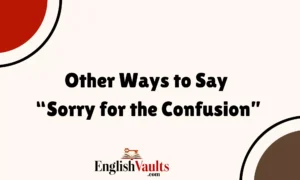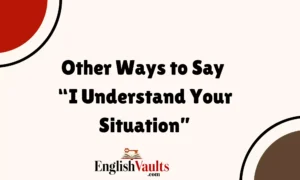In the realm of communication, expressing a lack of responsibility for a situation can be tricky. Saying “that’s not my problem” often comes across as dismissive or rude. Fortunately, many alternative phrases convey the same message more tactfully.
This article will explore 25 different ways to express that something is outside your area of concern, along with practical scenarios and email examples featuring Henry as the sender and Leo as the recipient.
List of Other Ways to Say “That’s Not My Problem”
1. “I’m Not the Best Person for That”
2. “That’s Outside My Scope”
3. “I Can’t Assist with That”
4. “I’m Not Involved in That Matter”
5. “That’s Beyond My Responsibilities”
6. “I Don’t Handle That Area”
7. “That’s Not Within My Expertise”
8. “I’m Afraid I Can’t Help”
9. “That’s Not My Area of Focus”
10. “I’m Unable to Address That”
11. “I Don’t Have the Capacity for That”
12. “That’s Not a Priority for Me”
13. “I Suggest You Contact Someone Else”
14. “I’m Not the Right Fit for This”
15. “That’s Not My Concern”
16. “I Have Other Priorities Right Now”
17. “I Can’t Take That On”
18. “I Don’t Think I Can Help You with That”
19. “I’m Not the Best Resource”
20. “I Don’t Have the Authority for That”
21. “I’m Not Sure I Can Address That”
22. “I’m Not Comfortable Taking That On”
23. “I’m Focused on Other Commitments”
24. “I’m Not Equipped to Handle That”
25. “That’s Not Something I Can Take Care Of”
1. “I’m Not the Best Person for That”
This phrase conveys that you’re not equipped to handle the issue at hand.
Email Example:
Subject: Project Collaboration
Hi Leo,
Thanks for reaching out about the new project. I appreciate your trust in my abilities. However, I believe I’m not the best person for that specific aspect. It might be better to consult with Sarah, as she has more experience in that area.
Best, Henry
Additional Tip:
Using this phrase opens the door for collaboration, suggesting that someone else might be more suitable without sounding dismissive.
2. “That’s Outside My Scope”
This phrase indicates that the matter falls outside your responsibilities.
Email Example:
Subject: Question About Budget Approval
Hi Leo,
I received your inquiry regarding budget approval. I wanted to let you know that’s outside my scope of responsibilities. I recommend reaching out to Melissa, who oversees financial matters.
Best regards, Henry
Additional Tip:
Framing your response in terms of scope helps clarify roles within a team and emphasizes that everyone has distinct responsibilities.
3. “I Can’t Assist with That”
A direct but polite way to indicate your inability to help.
Email Example:
Subject: Request for Technical Support
Hi Leo,
Thanks for your email. Unfortunately, I can’t assist with that issue as it pertains to technical support. I suggest you contact the IT department directly for a quicker resolution.
Take care, Henry
Additional Tip:
This phrase is effective in professional settings where boundaries need to be clear.
4. “I’m Not Involved in That Matter”
This communicates that you’re not part of the discussion or decision-making process.
Email Example:
Subject: Inquiry on Marketing Strategy
Hi Leo,
Thank you for reaching out. I wanted to clarify that I’m not involved in that matter, as it falls under the marketing team’s purview. They would be better suited to provide you with the necessary information.
Cheers, Henry
Additional Tip:
This phrase is useful for maintaining transparency in team dynamics, showing that you’re aware of your limitations.
5. “That’s Beyond My Responsibilities”
This alternative clarifies that the task at hand exceeds your role.
Email Example:
Subject: Customer Complaint Follow-Up
Hi Leo,
I appreciate you bringing this to my attention. However, I must inform you that that’s beyond my responsibilities. It would be best to escalate this to the customer service manager.
Best, Henry
Additional Tip:
This helps maintain professionalism and allows others to take the lead on issues that require specific expertise.
6. “I Don’t Handle That Area”
A straightforward way to indicate a lack of involvement in a particular area.
Email Example:
Subject: Inquiry About Product Returns
Hi Leo,
Thanks for your message regarding product returns. I want to clarify that I don’t handle that area. It’s best to reach out to the returns department for assistance.
Warm regards, Henry
Additional Tip:
Being specific about what you don’t handle can guide the recipient to the right resource quickly.
7. “That’s Not Within My Expertise”
This phrase emphasizes that the issue requires specific skills you don’t possess.
Email Example:
Subject: Technical Query
Hi Leo,
Thank you for your inquiry. I want to let you know that’s not within my expertise. I recommend contacting our technical specialist, Jason, who can provide the detailed support you need.
Best wishes, Henry
Additional Tip:
Highlighting expertise can help others understand the value of consulting the right people for certain issues.
8. “I’m Afraid I Can’t Help”
This polite phrase acknowledges the request but gently declines to assist.
Email Example:
Subject: Request for Additional Funding
Hi Leo,
I appreciate your request for additional funding for the project. However, I’m afraid I can’t help with that decision. Please reach out to the finance team for further assistance.
Best regards, Henry
Additional Tip:
Using “I’m afraid” softens the response and can make the decline feel more compassionate.
9. “That’s Not My Area of Focus”
This indicates that your attention is directed elsewhere.
Email Example:
Subject: Request for Market Research
Hi Leo,
Thanks for your email. I just wanted to clarify that that’s not my area of focus at the moment. It might be beneficial to connect with the research team for insights.
Best, Henry
Additional Tip:
This phrase helps to set boundaries while also suggesting alternative resources for help.
10. “I’m Unable to Address That”
A formal way to decline involvement in a request.
Email Example:
Subject: Follow-Up on Project Deadlines
Hi Leo,
Thank you for your follow-up on project deadlines. Unfortunately, I’m unable to address that at this time. I recommend discussing it with Laura, who is handling the scheduling.
Take care, Henry
Additional Tip:
Maintaining a professional tone ensures clarity and respect in your communication.
11. “I Don’t Have the Capacity for That”
This indicates a lack of available resources, whether time, knowledge, or energy.
Email Example:
Subject: Additional Workload Inquiry
Hi Leo,
Thanks for reaching out regarding the additional workload. I want to let you know that I don’t have the capacity for that right now. It may be best to delegate it to someone else.
Best wishes, Henry
Additional Tip:
This phrase highlights your current commitments and encourages workload management.
12. “That’s Not a Priority for Me”
This communicates that the matter isn’t urgent for you.
Email Example:
Subject: Request for Immediate Attention
Hi Leo,
I appreciate your request. However, I must let you know that that’s not a priority for me at the moment. I suggest discussing this with your supervisor for immediate attention.
Warm regards, Henry
Additional Tip:
Clarifying priorities helps manage expectations effectively.
13. “I Suggest You Contact Someone Else”
A courteous way to redirect the request to someone better suited.
Email Example:
Subject: Issue with Service Delivery
Hi Leo,
Thank you for bringing this issue to my attention. I suggest you contact someone else, perhaps the service manager, who can assist you better.
Best, Henry
Additional Tip:
This approach encourages collaboration and ensures the issue is addressed by the right person.
14. “I’m Not the Right Fit for This”
This indicates that you don’t align with the needs of the request.
Email Example:
Subject: Inquiry About Team Assignments
Hi Leo,
Thanks for your inquiry regarding team assignments. I wanted to mention that I’m not the right fit for this task. I recommend discussing it with Tom, who is leading that area.
Best regards, Henry
Additional Tip:
Being honest about fit helps foster effective teamwork.
15. “That’s Not My Concern”
This is a straightforward way to express a lack of concern.
Email Example:
Subject: Issue with Vendor Payment
Hi Leo,
Thanks for reaching out about the vendor payment issue. I want to clarify that that’s not my concern. Please speak to our accounts payable department for assistance.
Take care, Henry
Additional Tip:
This phrase can be seen as blunt; use it cautiously to maintain professionalism.
16. “I Have Other Priorities Right Now”
This indicates that your focus is on different tasks.
Email Example:
Subject: Request for Assistance on a Project
Hi Leo,
I appreciate your request for assistance on the project. However, I have other priorities right now that I need to focus on. It might be best to reach out to another team member.
Best, Henry
Additional Tip:
Communicating your priorities can help manage expectations and ensure transparency.
17. “I Can’t Take That On”
A simple way to state your inability to accept additional responsibilities.
Email Example:
Subject: Request for Extra Work
Hi Leo,
Thank you for considering me for this extra work. I want to be clear that I can’t take that on at this moment due to my current commitments.
Warm regards, Henry
Additional Tip:
This reinforces your boundaries and protects your time.
18. “I Don’t Think I Can Help You with That”
This phrase expresses your doubts about your ability to assist.
Email Example:
Subject: Request for Feedback on Proposal
Hi Leo,
Thank you for sending over the proposal for feedback. I don’t think I can help you with that as it falls outside my expertise. Perhaps you could reach out to Sarah for her insights.
Best, Henry
Additional Tip:
Honesty about your capabilities fosters trust and openness in communication.
19. “I’m Not the Best Resource”
This indicates that you aren’t the most knowledgeable person for the task.
Email Example:
Subject: Question About Compliance
Hi Leo,
Thanks for your inquiry about compliance. I wanted to let you know that I’m not the best resource for that topic. It’s advisable to connect with the compliance officer for accurate guidance.
Take care, Henry
Additional Tip:
Directing individuals to the right resources builds a stronger, more informed team.
20. “I Don’t Have the Authority for That”
This clarifies that the decision or action requires a different level of authority.
Email Example:
Subject: Request for Policy Change
Hi Leo,
Thank you for your request regarding the policy change. Unfortunately, I don’t have the authority for that decision. It would be best to escalate this to management for consideration.
Best, Henry
Additional Tip:
Clarifying authority can help avoid misunderstandings in organizational structures.
21. “I’m Not Sure I Can Address That”
This indicates uncertainty about handling the request.
Email Example:
Subject: Need Help with a Difficult Client
Hi Leo,
Thanks for reaching out regarding the difficult client situation. I’m not sure I can address that effectively. It might be helpful to consult with our senior account manager.
Best wishes, Henry
Additional Tip:
Acknowledging uncertainty encourages seeking support and collaboration.
22. “I’m Not Comfortable Taking That On”
This phrase expresses hesitation about handling the request.
Email Example:
Subject: Request for Conflict Resolution
Hi Leo,
Thank you for your email. I appreciate your trust in me; however, I’m not comfortable taking that on. It would be best to involve someone with more experience in conflict resolution.
Warm regards, Henry
Additional Tip:
Expressing discomfort can promote a culture of support and understanding within the team.
23. “I’m Focused on Other Commitments”
This communicates that you’re preoccupied with other tasks.
Email Example:
Subject: Request for Project Assistance
Hi Leo,
Thanks for your request for project assistance. I want to let you know that I’m focused on other commitments right now. It may be beneficial to reach out to Alex, who is available.
Best, Henry
Additional Tip:
This approach keeps communication open while clarifying your current workload.
24. “I’m Not Equipped to Handle That”
A way to express that you lack the necessary tools or skills.
Email Example:
Subject: Inquiry About Technical Issues
Hi Leo,
I appreciate you contacting me about the technical issues. Unfortunately, I’m not equipped to handle that. I recommend reaching out to the IT department for assistance.
Take care, Henry
Additional Tip:
This phrase reinforces the idea that certain issues require specialized skills.
25. “That’s Not Something I Can Take Care Of”
A clear and straightforward way to communicate your limitations.
Email Example:
Subject: Inquiry About Contract Negotiation
Hi Leo,
Thank you for reaching out regarding the contract negotiation. I just want to clarify that’s not something I can take care of. It would be best to discuss this with our legal team.
Best regards, Henry
Additional Tip:
This reinforces your boundaries while directing the inquiry to the appropriate party.
Conclusion
Navigating communication in the workplace can be challenging, especially when addressing issues that fall outside your responsibility. By using these 25 alternative phrases, you can convey the message that something isn’t your problem while maintaining professionalism and respect. Remember, how you phrase your response can significantly impact your relationships and the overall atmosphere in your workplace. By choosing your words wisely, you foster a culture of collaboration and support, ultimately leading to a more productive environment.










